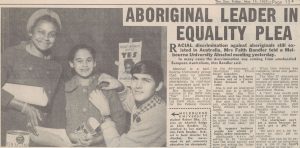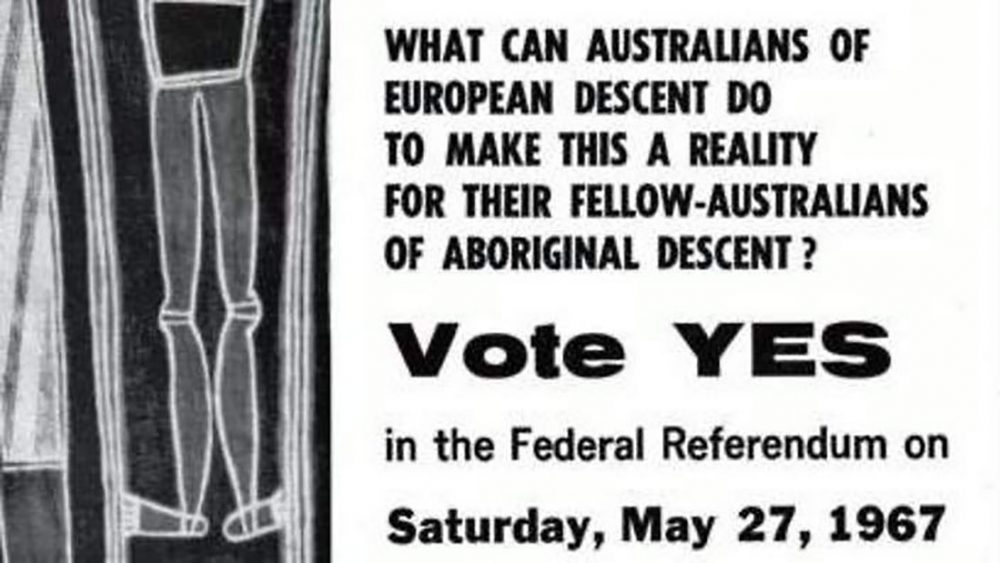A referendum to remember
Common Grace asked those who remember the 1967 Referendum what its significance was and whether it has changed our nation since.
Today marks 50 years since the 1967 Referendum which altered the Australian Constitution to count Aboriginal and Torres Strait Islander peoples in the census and give the Australian Government the power to make laws for Aboriginal and Torres Strait Islander peoples. We asked those who were there what the Referendum was about and whether it has changed our nation since.
On 27 May 1967, Australians headed to the polls to decide whether two clauses in our Constitution should be removed. These clauses specifically discriminated against Aboriginal peoples, depriving them of certain basic citizenship rights, and excluding them from being counted in the census.
For 180 years Aboriginal and Torres Strait Islander peoples had experienced dispossession and injustice at the hands of the British colonies and then the Federated States. And while they had no legal protection in the 1901 constitution, they had indeed been exposed to the most horrendous policies aimed at their eradication rather than flourishing in this country.
Rev. Aunty Alex Gater, the first Aboriginal woman to be ordained within the Anglican Church of Queensland, remembers how she felt as an Aboriginal person prior to the 1967 referendum:
“I felt proud to be an Aboriginal. But us Aboriginal people faced discrimination. If you were the first to go into a shop you were last to be served. When you applied for housing you were told there were no houses available for blacks. We were discriminated against in housing, employment, even in the schools.”
Prior to the 1967 Referendum, Aboriginal peoples were subject to State legislations. Queensland and Western Australia were the most restrictive. Many aspects of Aboriginal peoples lives were controlled by the government. Injustices included but were not limited to not being able to move freely, not being able to marry freely, and not being paid the same wage for the same work. The right to vote was granted only in 1962 with the amendment of the Commonwealth Electoral Act, however voting in State elections was still restricted until the 1967 Referendum. Today in 2017, the Australian Constitution still allows a race of people to be disqualified from voting in State elections (s25).
In the decade before the Referendum, the tide of public opinion concerning first nations peoples had begun to shift. The actions of the Aboriginal and Torres Strait Islander peoples through the Federal Council for the Advancement of Aborigines and Torres Strait Islanders (FCAATSI) were instrumental in bringing this change. Through the faithful leadership of Aboriginal leaders such as Charlie Perkins, Sir Doug Nicholls, Joe McGinness, Oodgeroo Noonuccal (formerly Kath Walker), Bert Groves, Bill Onus and Chicka Dixon, there was a growing public appreciation of the worth, dignity and equality of Aboriginal and Torres Strait Islander peoples, and their right to equal protections and support under the law.
There are many reasons the 1967 Referendum was successful, one being that all major political parties supported a yes vote with no opposing case being presented. An important reminder for any future Referendums. Another key element was that the campaign were also lead by non-Aboriginal Christians. Australian churches were early advocates for the Referendum. The Australian Council of Churches, the Methodist Commission on Aboriginal Affairs, and the Society of Friends had developed policies that supported the proposed outcomes of the 1967 Referendum.
Shirley Collins from NSW was teaching at Nanama Aboriginal School in Wellington when she voted in 1967. As a non-Aboriginal woman now in her eighties, she recalls her clear conviction that day on how she was going to vote:
“I didn’t have any doubts as to which way I was going to vote. Of course they needed to be counted, because they’re human beings and they are Australians. It was ridiculous that they were never counted in the census and counted as being human beings. It was just so ridiculous.
I just accepted the fact that they were loved by God, and that they were human beings and so if God loves them we should love them too.”
This ridiculousness that Shirley refers to is even further highlighted in the words of the late Faith Bandler, General Secretary of FCAATSI, who, in 1965, pointed out, “People in Australia have to register their dogs and cattle, but we don’t know how many Aborigines there are.”

1967 Melbourne Sun Newspaper story on Aboriginal leader Faith Bandler Trove
While Referendums had a history of not being passed, the 1967 vote passed overwhelmingly with 90.77% of Australians in favour of the amendments. It was the most successful Referendum outcome in Australia’s history and briefly inspired hope in a society where every individual regardless of race could enjoy equal rights.
Aunty Jean Philips, one of Australia’s leading Aboriginal Christian leaders, remembers those who stood with Aboriginal peoples on that day:
“Well, I really believe that there wouldn’t have been the vote that there was, if it wasn’t for people who challenged. And, amongst them were Christians. I want to say thanks to all the Aboriginal and non-Aboriginal who took up the challenge. But there are still very big issues that are before us.”
Faith Bandler had commented on one of the major positives of the 1967 Referendum, “It brought black and white together with more respect for each other and more respect for the country as a whole.” For our nation, it was the first time we had taken a first step together towards true Reconciliation.
But the issues of discrimination and injustice facing Aboriginal and Torres Strait Islander peoples in this nation were not resolved by a change in the constitution. Still today in 2017, Reconciliation Australia reported that one in three Aboriginal and Torres Strait Islander peoples had experienced recent verbal racial abuse. For Aunty Jean Philips, having ministered and worked for Aboriginal and Torres Strait Islander justice for more than 50 years, any commitment to Reconciliation must acknowledge the issues of the present, rather than rest of the achievements of the past:
“A lot of people are talking about Reconciliation, but nobody is talking about poverty and justice. In the meantime, our people are just struggling out there. You can’t have Reconciliation until you’ve dealt with the intervention in the [Northern] Territory, the theft of the land; these are things that Christians should be talking about because they’re real and they’re the things that are affecting our people. That’s what we need to sit down and talk about.”
This concern is shared by Rev. Aunty Alex Gater, who everyday in her role as a priest and Aboriginal elder, sees these same injustices that were there before the Referendum:
“With this Referendum, I feel like what’s happened in the past is still happening in the present. It feels like nothing has changed for Aboriginal people, we still face discrimination. In my work in the prisons as a chaplain I see the overrepresentation of Aboriginal people in the prisons. There is homelessness because our people can’t afford housing with the high rent. Health, housing, education, employment, youth suicide. It’s one step forwards, two steps backwards, and Aboriginal people are asking when is it going to stop, when is this government going to sit down and listen to our concerns, work together in harmony? Reconciliation means making things right.”
But while the injustices are still prevalent today, Aunty Alex calls us forward into a process of making things rights, following those Aboriginal Christian leaders who go before us:
“I am still proud to be an Aboriginal woman. We have come a long way, and when you look across Australia and see the achievements that we have because of our elders of past time, the sacrifices they made, and what they put in place. They laid the foundation, they paved the way for us. They had a hard life, our parents, our grandparents, but they got on with the job and worked with government and churches to bring about change. And that’s what we’re doing today, carrying on their work, to bring about change working together in harmony, to break down barriers and to work together to put something in place for the next generation.”
The 1967 Referendum was a first step towards Reconciliation. When we look at the levels of disparity between Aboriginal and Torres Strait Islander peoples and non-Indigenous Australians in education, health, housing, poverty, prison incarceration, deaths in custody, suicide, and life expectancy, the reality of 2017 hits us. This reality needs to hit us as hard as the reality hit those of voting age in 1967. There are many other steps we need to take together to bring dignity, equality and Reconciliation in this land we now call Australia. As Sir Doug Nicholls once said, “You can play a tune on black keys, and you can play a tune on white keys, but both are needed for perfect harmony.” We are still waiting for that perfect harmony.
Followers of Jesus were standing with Aboriginal peoples in 1967 in love. Jesus call for us to love one another is still as loud and clear today in 2017. May we all have ears to hear that call, hearts to love as we stand side by side one another, and courage to pursue justice. May we follow the examples of the Aboriginal leaders that have gone before us, leaders not only of Aboriginal peoples, but leaders of our nation, leaders that inspire us to fight for “truth, justice, love and hope”. Leaders that help us take the next steps – steps towards building a different Australia. As Aunty Jean says, “Let us build a better Australia for all Australians.”
This article is part of series from Common Grace on listening and learning throughout Reconciliation Week. If you’d like to follow along you can signup on their website or follow the series on Facebook.


